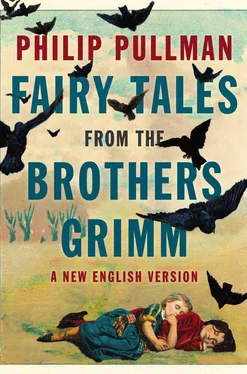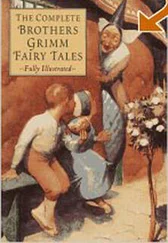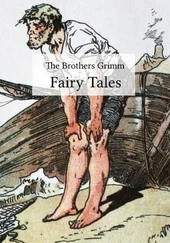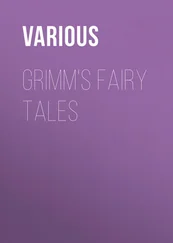‘As you wish,’ said the king, ‘but on the same condition. If he loses, you’ll both go to the scaffold.’
They agreed on the terms: each runner was to be given a jug in which to bring some water from a spring that was a long way off, and the first one back would win. When everything was ready, the soldier buckled on his servant’s leg for him and said, ‘Don’t hang about. It’s your head too, remember.’
The runner and the king’s daughter took their jugs and set off. After less than a minute, when the king’s daughter had only gone a little way, the runner was already out of sight. In no time at all he reached the spring, filled his jug and turned around. Halfway back, though, he felt like taking a nap, so he lay down and closed his eyes, using for a pillow a horse’s skull he found lying on the ground, so he wouldn’t feel too comfortable; he didn’t want to sleep too long and lose the race.
Meanwhile, the king’s daughter, who was much better at running than common people, had reached the spring. She filled her jug and set off at once on the return lap, and soon she came across her opponent lying fast asleep.
‘The enemy’s been delivered into my hands!’ she thought, and emptied his jug before running on.
And everything would have been lost, if the hunter hadn’t happened to be standing on the castle walls, watching it all with his sharp eyes.
‘The king’s daughter shan’t beat us!’ he cried, and he loaded his gun, took aim and shot the horse’s skull out from under the runner’s head, waking him up with a jolt.
The runner sat up and blinked, and saw at once that his jug was empty and that the king’s daughter had overtaken him. Not a bit worried, he raced back to the spring, filled his jug again and sped back to the town, managing to beat the king’s daughter by ten minutes.
‘I was just beginning to stretch my legs,’ he said. ‘It could hardly be called running, what I was doing in the first lap.’
The king wasn’t at all pleased to lose his daughter to a common soldier, and as for the daughter, she liked it even less; so they put their heads together to think of a way of getting rid of both him and his companions. Finally the king said, ‘Ah! I’ve got it. Don’t you worry, we’ll make sure they never see their homes again.’
He went to the six and said, ‘I want to make sure you fellows have a good time. Eat, drink and be merry!’
He led them to a room that had an iron floor, and the doors were made of iron too, and the windows had heavy iron bars. In the middle of the room was a table spread with a splendid feast, and the king said, ‘In you go, and enjoy yourselves!’
As soon as they were all inside, he had the door locked and bolted. Then he sent for the cook and told him to light a fire in the room below, and build it up and keep feeding it till the iron glowed red-hot. The cook did so, and before long the six companions sitting round the table began to feel warm. At first they thought that was because of the food they were eating, but when it got hotter and hotter and they tried to leave the room, they found the door locked and the windows barred. Then they realized what the king was up to: he was intending to burn them alive.
‘Well, let him try,’ said the man with the cap on sideways. ‘I’ll bring a frost that’ll have this fire crawling away in shame.’
So he put his hat on straight, and such a frost set in that the heat faded at once and the food on the table began to freeze. After a couple of hours had gone by the king thought they must all have burned to death, so he had the door opened to see; but he found them all in the best of health. In fact they said they’d like to come outside and warm up a bit, because it was so cold in there that the food had frozen to the plates.
The king was furious, and went downstairs to scold the cook.
‘I thought I told you to make the fire hotter and hotter!’
‘And so I did, your majesty — here it is, look, blazing away!’
When the king saw the raging fire he realized that he hadn’t got the better of the six companions yet, and he’d have to try something cleverer next time.
So he cudgelled his brains and finally thought he had found a way of getting rid of them. He said to the soldier, ‘Look, you’re a man of the world, let’s be straight with each other. If I give you some gold, will you give up the princess and clear off?’
‘Fair enough,’ said the soldier. ‘What about letting me take as much as one of my servants can carry? Then I’ll say cheerio to the princess and we’ll be off.’
‘Just one servant?’
‘Just the one. Give us a couple of weeks and then we’ll come to collect it.’
The king agreed. The soldier went off and summoned all the tailors in the kingdom, and gave them the job of sewing one gigantic sack. It took them two weeks, and when it was ready the strong man, the one who pulled up trees, slung it over his shoulder and went with his master to the king.
The king saw them coming, and said, ‘Who’s that extraordinary fellow carrying that huge bundle of canvas over his shoulder? Good Lord, it’s as big as a hou—’
Suddenly he realized who the man was. ‘Oh no!’ he thought. ‘That’s the servant who’s going to carry the gold — and that’s the sack he’s going to carry it in! I don’t believe it!’
The king ordered his treasurers to bring a ton of gold, thinking that surely that would be enough. It took sixteen mighty bombardiers to carry it all out, but the strong man tossed it into his bag with one hand and said, ‘This hardly covers the bottom. Get a move on and bring some more — we want to leave today.’
Little by little all the king’s treasury was brought out, and the strong man tossed it all into the sack.
‘Still not half full!’ he said. ‘You’ve brought nothing but crumbs so far. Keep going!’
So they had to send for seven thousand wagons filled with gold from all over the kingdom, and the strong man tossed them all into the sack together with the oxen that pulled them.
‘Well, it’s not quite full, but that’ll have to do,’ he said. ‘No point in being greedy about it.’
And he swung the sack up over his shoulder and went off with his companions.
The king watched all this, and when he saw all the wealth of his kingdom disappearing on the back of one man, he lost his temper.
‘Send the cavalry after them!’ he ordered. ‘I won’t stand for this. Bring back that gold!’
The two finest regiments soon caught up with the soldier and his servants, and their commander called out: ‘Hands up! Put down that sack of gold and stand back, or we’ll cut you to ribbons!’
‘What’s that he’s trying to say?’ said the blower. ‘Hands up? Cut to ribbons? Let’s see how you like dancing around in the air.’
He closed one nostril and blew through the other, and in moments every horse and every rider was whirled into the air as if a hurricane was tossing them about, here, there and everywhere. Some went high, some were scattered among the bushes, and one sergeant called out, ‘Mercy! Mercy!’
He was a valiant fellow, who’d been wounded nine times in the king’s service, so the blower and his companions didn’t want to humiliate him, and they let him down gently.
‘Now go back and tell the king to send as many regiments as he wants,’ said the blower, ‘and I’ll make them all dance in the clouds like yours.’
When the king got the message, he said, ‘Oh, let the fellows go. I’ve had enough.’
So the six made their way home, divided up their fortune, and lived happily for the rest of their days.
* * *
Tale type:ATU 513A, ‘Six Go Through the Whole World’
Читать дальше












